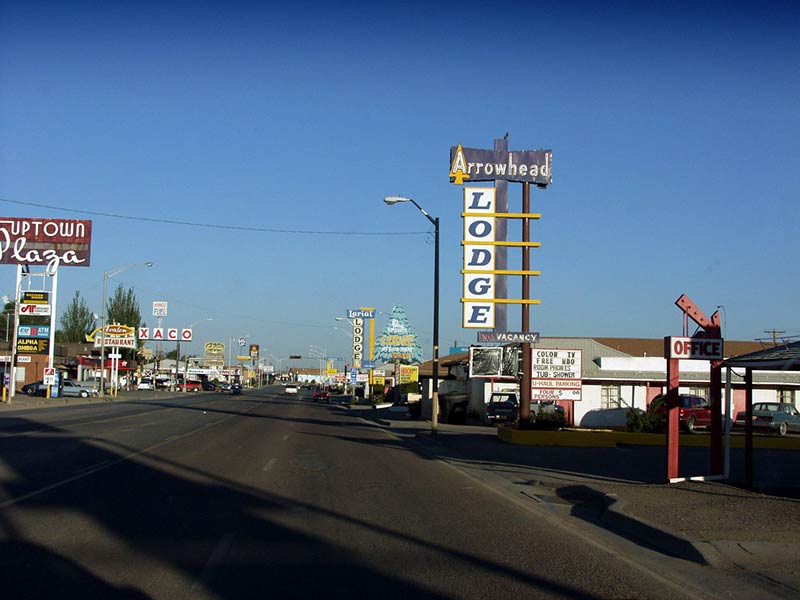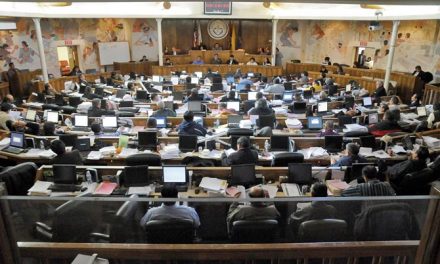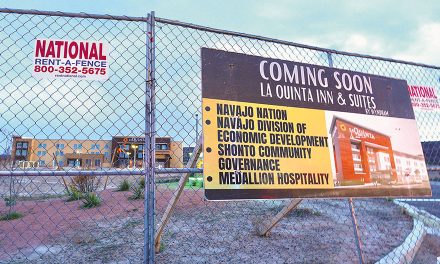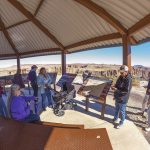
Letters: Alcoholics belong with their families, not in border towns

Gallup, New Mexico. ("Gallup, New Mexico" by afiler from Seattle (ex-Minneapolis) - Gallup, New Mexico. )
I have been listening and reading about all the horrible things that are happening among the general public, mainly the Navajo people, some are justified and most are self-inflicted.
Watching TV and reading the newspaper of all these tragedies, there seems to be no end.
God’s word says where are all the philosophers, great teachers and educated people? The society is unraveling at all the seams.
We hear about all the federal, state, county, and Navajo Nation monies coming in, but the statistics show that crime has increased in every area.
Recently I read an article of a small tribe in North Dakota who had received over $2 billion from royalties and sad to say, that poverty is still hovering over the people.
This should tell us something that the amount of money is not the answer. It is only one small piece of the puzzle in recovery.
Then on top of that there are all kinds of governmental support services by federal, state, county, and Navajo Nation that are abundantly available, but the substance abuse, crime, domestic violence, hopelessness, suicide, and murder keeps increasing.
We know crime pays devastatingly; it destroys families, relationships and lives.
There’s the other side, which is not talked about, the staff, practitioners and medical people who are being paid. So there are two sides of every situation of life.
Which side are we on? Are we seriously trying to help people or we benefiting from it to make our lives better?
Another piece of the puzzle are the availability of detox and treatment centers, which have been operating for a few years.
We should know that it takes a lot of money to operate these facilities. Were they completely effective? I disagree; it only pays the staff generously.
Recently some churches came together to assist these street people (alcoholics, homeless, etc.) with clothes, meals and a place to stay.
I applaud these churches for stepping out of their comfort zone. Thank you to all the churches in Gallup in providing these services.
The Native churches need to get involved. These are your people needing help.
Now all these services are wonderful, again they are another piece of the puzzle.
They do not reach the whole person of the alcoholics.
All these services being offered in Gallup will not last very long because volunteers are needed.
There are very few people wanting to reach out to these people.
These offered services are actually enablers.
Do you think providing clothes, meals, and a place to stay will make them stop drinking? No way! What will happen is they will want to stay in Gallup and even invite their alcoholic friends to join them in town.
So there’s going to be more alcoholics in every border town.
They will not want to go home at all (back to the rez). Now, do you think these men and women will be nice boys and girls? Again, no way! All the embarrassing activities will increase along with public drinking.
Now here is my elementary point of view. First of all, Gallup churches and Navajo people, we need to understand that we have a terrible drinking problem.
We’ve been pointing fingers at border town citizens. No one forces us to drink alcohol and other problem areas. Pointing fingers will not solve the problem we are facing.
Personal responsibilities of our lives begin by examining ourselves and begin targeting the area that’s tearing our lives apart.
Mainly Native churches need to come together and provide these services.
Also, the Native churches on the reservation need to get involved in reaching out to these people.
Develop cooperative agreements in working with these people.
Gallup churches would personally get to know one person and where they are from.
Once this is accomplished, then the Gallup churches will call the Native church and inform them of this individual.
The reservation church will find the family and begin to counsel the family.
After several weeks of counseling the individual and family, the Gallup church will transport the individual to his/her family living on the reservation or the Native church will meet them halfway to take the person to his/her family.
Then the Native church will take on greater responsibility in counseling the family of the long awaited reconciliation.
These alcoholics/homeless need to be reunited with their families.
ThatUs where they belong, not at border towns.
When the alcoholic is reunited with the family further treatment needs to be established for the whole family.
The people from Native churches need to be trained and offer services to the hurting families.
Long awaited services offered by Native churches are almost absent.
It is time for the Native pastors to reach out to the alcoholics and homeless.
This part will almost complete the whole puzzle.
The final piece is the spiritual area.
The road to recovery goes only through the Lord Jesus Christ.
He is the only one who changes the heart of a person so that individual can live a trustworthy and renewed life.
He created the human race, so we should go to Him for all our problems.
Milt Shirleson
Window Rock, Ariz.
Thoughtless statements by Navajo leadership on water rights
Navajo people since the time of creation and throughout our traditional journey stories have understood an important concept: Without water there is no life.
Similarly, state governments in the southwest understand this concept as well.
For Arizona, New Mexico, Nevada, and Southern California, without water there is no economic survival.
As I’m told from Navajo people who stand watch over Navajo water rights, and from what IUve read in the law books my son gave to me, the United States Supreme Court has heard cases on water rights that were filed by states in the southwest.
These states argued to limit the amount of reserved water rights that Native American tribes are entitled to so that state interests would be protected and that state economies would be secure for future growth.
With this background, I understand that when it comes to water rights in the southwest, state governments are directly opposed to the interests that tribal governments have in protecting tribal water rights.
Given this understanding, you can imagine my surprise when I read in a local newspaper that our very own Navajo Nation Vice President, Jonathan Nez, asked Arizona Governor Doug Ducey to ‘champion’ Navajo water rights issues.
The only water rights interest that Gov.
Ducey will champion is the state of Arizona’s.
For Vice President Nez to make this bizarre request of Gov.
Ducey is like a farmer asking a fox to guard the farmer’s hen house.
The only outcome for the Navajo Nation in this scenario is the loss of water rights, and for the farmer to lose his chickens to fox.
Over the years, true Navajo water rights champions have pressured Navajo Nation leadership in the Council and in the presidentUs office to be more diligent in protecting the Navajo people’s water rights.
For a brief moment there appeared to be some movement in the right direction during the administration of a former Navajo president with the creation of the Navajo Nation Water Rights Commission to oversee Navajo water rights.
However, over the course of time and influence from Navajo Nation Department of Justice water rights attorneys, Navajo Water Rights Commissioners and Navajo Nation leaders were undermined.
This is clearly the case when we read that Vice President Nez asked the governor of Arizona to champion Navajo water rights.
If this is an indication of the Begaye-Nez administration’s ‘New Dawn,’ I’m fearful for what the next three years will bring for Navajo water rights.
A review of recent Navajo water rights history bears painful lessons that the Begaye-Nez administration should learn from.
During the previous administration of Navajo President Ben Shelly, a press release from former Arizona Senator Jon Kyle’s office on the waiver of Navajo water rights (in relation to the proposed Senate Bill 2109) created a firestorm of controversy for Navajo leadership and for Arizona Sen. Kyle and Sen. John McCain.
In Tuba City, true Navajo water rights champions expressed intense displeasure with the secretive closed door dealings occurring between President Shelly, Navajo Nation Department of Justice water rights attorneys, and Sen. Kyle and Sen. McCain.
The Navajo people’s opposition to Senate Bill 2109 led former Navajo President Shelly to hold community meetings -after the fact- where major elements of Senate Bill 2109 were propagandized and pushed upon the people.
Fortunately, the Navajo people’s overwhelming opposition to Senate Bill 2109 terminated this legislative measure, much to the embarrassment of President Shelly, Navajo Nation water rights attorneys, Sen. Kyle, and Sen. McCain, who all felt this bill would be a slam dunk.
The lesson here is that Navajo leadership and the Navajo Water Rights Commissioners must consult with Navajo people when it comes to important issues like Navajo water rights.
Navajo leadership must communicate strategically to protect Navajo interests.
Navajo leadership must think critically and question the strategy of Navajo water rights (if any exists) being pushed by Navajo Nation water rights attorneys.
On ending, thoughtless statements by Navajo leadership requesting Arizona state leadership to champion Navajo water rights is a dangerous proposition that may destroy the future of the Navajo people.
Water is life.
Irma Bluehouse
Milton Bluehouse Jr.
Ganado, Ariz.
To read the full article, pick up your copy of the Navajo Times at your nearest newsstand Thursday mornings!
Are you a digital subscriber? Read the most recent three weeks of stories by logging in to your online account.








 Highway 264,
Highway 264, I-40, WB @ Winslow
I-40, WB @ Winslow